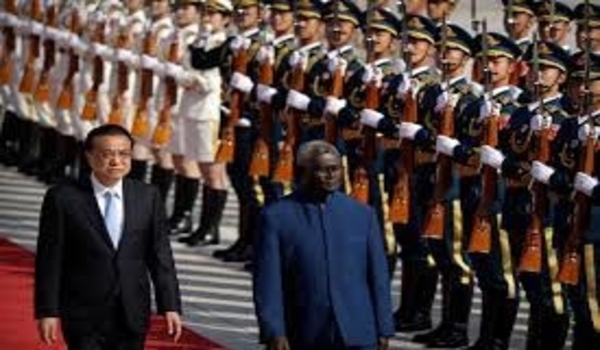Solomon Islands-China security pact alarm: US, others concerned after China announced signing deal
China said on Tuesday it had signed a security pact with the Solomon Islands, a move set to heighten concerns of the United States and allies Australia and New Zealand about growing Chinese influence in a region traditionally under their domain.
Chinese foreign ministry spokesperson Wang Wenbin said the framework pact had been signed recently by State Councilor Wang Yi and Solomon Islands Foreign Minister Jeremiah Manele. He did not detail where or when the signing took place.
However, Solomon Islands officials earlier said security cooperation is being considered with China thus appearing to suggest no agreement had yet been signed.
Douglas Ete, chairman of Parliament’s public accounts committee, told fellow lawmakers that Chinese officials would arrive in mid-May to sign cooperation pacts. Prime Minister Manasseh Sogavare has been defending the security pact his government signed with China on Tuesday. He told parliament the agreement with Beijing was necessary to deal with the Solomon Islands’s “internal security situation” but that the proposal would not include a Chinese military base.
Ete said the agreements would increase cooperation on trade, education and fisheries, but that he opposed the idea of allowing China to establish a military base.
Meanwhile, Solomon Islands officials had previously initialed a security pact with the Chinese Embassy that would allow Chinese police to protect infrastructure and social order, but ministers had not yet signed it.
In Washington, the White House, which is sending a high-level U.S. delegation to the Solomons’ capital, Honiara, this week, said it was concerned about “the lack of transparency and unspecified nature” of the pact.
A spokesperson for the White House National Security Council (NSC) said the reported signing “follows a pattern of China offering shadowy, vague deals with little regional consultation in fishing, resource management, development assistance and now security practices.”
The NSC later said the United States would “intensify its engagement in the region to meet 21st-century challenges, from maritime security and economic development to the climate crisis and COVID-19.”
Australian officials said China appeared to want to pre-empt the arrival of the U.S. delegation in Honiara, which the White House said would discuss concerns about China, as well as the reopening of a U.S. embassy.
But Canberra is concerned that the pact could be a step toward a Chinese military presence less than 2,000 km (1,200 miles) from Australia’s shores.
Foreign Minister Marise Payne said Australia was “deeply disappointed” and continued to seek details of the terms of the agreement, noting that the signing had been announced by China.
She also expressed concern about a lack of transparency and said the pact had the “potential to undermine stability in our region.”
Australian national broadcaster ABC said Sogavare planned to make an announcement in the coming days.
Last week it would be recalled, that Zed Seselja, Australia’s minister for international development and the Pacific, visited Honiara to ask Sogavare not to sign.
Greg Poling, an Asia maritime security expert at Washington’s Center for Strategic and International Studies, said: “The language leaked last week is quite vague and so there’s plenty of room to mitigate damage by narrowing how it will be implemented.”
“So the U.S. delegation, as with the recent Australian delegation that visited, are trying to convince the Solomons’ government to reverse course if possible, or at least to clarify the details and plans for implementation if not,” he said.
China is already the Solomon Islands’ top export destination, buying some 65 per cent of Honiara’s exports in 2019, followed by Italy at 9 percent. Australia is the destination of less than 1 percent of Solomons’ exports.
China is also the source of just less than a quarter of the country’s imports, followed by Australia with 13 percent.
In announcing the security deal, Beijing framed it as “normal exchange and cooperation between two sovereign and independent countries”.
Foreign Ministry Spokesperson Wang Wenbin said Western powers were “deliberately exaggerating tensions” over the pact.
China’s state media has cast Beijing as a benign power in the Pacific, suggesting it is the US that wants to build its military might in the region.
“The Solomon Islands should realize it is under the special attention of Washington because the US wants to use it as a pawn to contain China,” the tabloid Global Times wrote in an op-ed on Wednesday.




